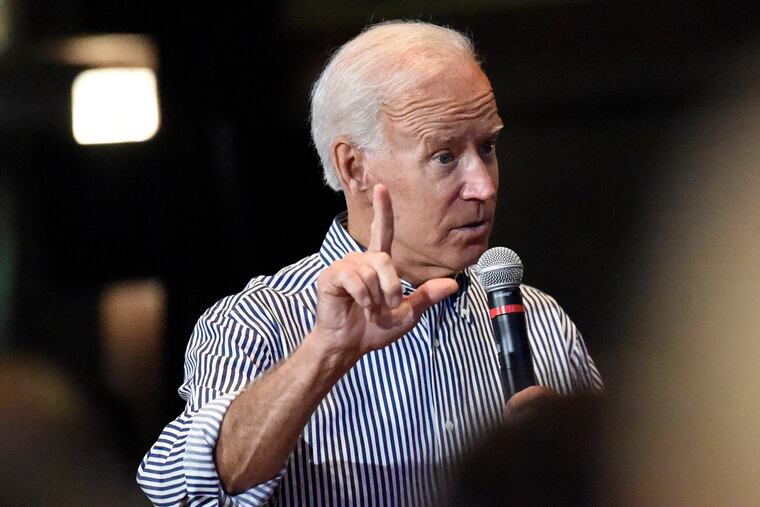About that poll showing Joe Biden slipping? Maybe not.
New polls appear to confirm the Democratic primary is fairly stagnant, with only five candidates gaining any real traction.

WASHINGTON — A poll out this week seemed to show a significant shift in the Democratic presidential primary race — the first major movement in months. But surveys since then have painted an opposite picture, depicting a status quo race in which Joe Biden continues to lead, with Sens. Elizabeth Warren and Bernie Sanders battling for second.
The newer polls appear to confirm a defining feature of the Democratic race for months: It is fairly stagnant, with only five candidates having any real traction. The result has left stragglers unable to build momentum and has forced out several, including Sen. Kirsten Gillibrand of New York, who ended her campaign Wednesday.
Here’s what the polls say about the state of the race as we head toward Labor Day, a tighter Democratic debate Sept. 12, and a more intense period of campaigning.
It’s the ‘Big Five’ and everyone else
The early months of the campaign established a clear pecking order. Biden leads with support from around a third of Democratic voters, heavy support coming from more moderate voters and African Americans. Warren, of Massachusetts, and Sanders, an independent from Vermont, are battling for second place, competing for voters from the party’s liberal wing. Sen. Kamala Harris of California is in fourth and South Bend, Ind., Mayor Pete Buttigieg is fifth.
No one else has gotten greater than 3% support in the majority of polls, suggesting that for all their options, Democratic voters, so far, are looking at a relatively narrow range of contenders. There have been more than 20 candidates in the early stages of the campaign.
>>READ MORE: In Iowa, Pete Buttigieg says his presidential campaign is here for more than a ‘moment’
Warren has seen steady growth, and Harris has surged and fallen back, but otherwise little has changed. Consider a Quinnipiac University poll out Wednesday. It had Biden leading with 32% support, followed by Warren (19%), Sanders (15%), Harris (7%), and Buttigieg (5%). No one else had more than 3%. Similarly, a USA Today/Suffolk poll went: Biden (32%), Warren (14%), Sanders (12%), and Harris and Buttigieg (each with 6%). Politico/Morning Consult found it as Biden (33%), Sanders (20%), Warren (15%), Harris (8%), and Buttigieg (5%).
Each poll, of course, comes with a margin of error, but they all paint the same broad picture — and match months of other polling. They also contrast with the Monmouth University poll released this week indicating that Biden’s support had dropped sharply and put him into a three-way tie with Warren and Sanders.
The poll’s director, Patrick Murray, later released a statement acknowledging that his findings in this instance were an outlier. Monmouth is a reputable polling outfit, but as Murray noted, outliers happen.
The winnowing has begun, and many others are at risk
The lack of support, or seeming interest, in many of the other Democrats is starting to thin the field. Only 10 of the Democrats running met the qualifying criteria for the upcoming debate in Houston, creating a stark dividing line. But half of those who made the debate stage haven’t budged in the polls.
It’s possible that this smaller debate, with everyone on one stage, will allow some of the lower-tier candidates to get a closer look. But if trends continue, more may have to join Gillibrand, Jay Inslee, John Hickenlooper, and others in calling it quits.
A changing view of the economy, and a warning sign for Trump
Perhaps the most significant data in the recent polls had nothing to do with the Democrats.
Quinnipiac found that for the first time since President Donald Trump’s election, more Americans believe the economy is getting worse (37%) than better (31%). That’s a huge shift from June, when 23% said the economy was getting worse.
>>READ MORE: Pa. hit a record low in unemployment. Will that help Trump win again in 2020?
The economy has been Trump’s strongest argument for reelection, and something many supporters use to counter complaints about his personal conduct. A drop in the economy, or voters’ perceptions of it, could be a significant blow no matter who emerges from the Democratic primary campaign.
Questions about the economy, Trump’s job-approval rating, and potential general-election matchups were asked of 1,422 registered voters, and results were subject to a margin of error of plus or minus 3.1 percentage points.
On the Democratic primary, Quinnipiac interviewed 648 people who said they were Democrats; results were subject to an error margin of plus or minus 4.6 points.
>>READ MORE: Dems take aim at economy, trying to undercut Trump’s biggest strength